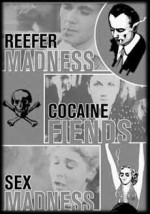
Marijuana – the devil’s weed, scourge of the children of America. Among its many dangerous effects are hysterical laughter, loss of inhibitions, lusty depravity, and finally insanity. It will make you sleep around, drive too fast, and kill people left and right. The best part is, since people who distribute this “powerful narcotic” are purely evil, you apparently won’t even have to pay for it.
This may be a slight exaggeration.
However, that’s exactly the message of perhaps the most infamous exploitation film ever made, “Reefer Madness” (originally titled “Tell Your Children”). In a time when the public was largely uninformed on the topic of illegal drugs, a few pioneering filmmakers and investors saw film as a way to steer the conscience of America in a specific direction.
As a result, films like “Reefer Madness,” “Cocaine Fiends” (also known as “The Pace that Kills”), “Sex Madness,” and countless other manipulative melodramas did their best to convince a naïve movie audience that the specific evil mentioned in the title was nothing less than a tool of pure evil sent by Satan to corrupt the good Christian youths of our society.
No matter what your stance on drug use, these films are both painful and hilarious to watch. In an apparent case of the blind leading the blind, people with little or no knowledge of these drugs try to explain to their audience how their children will instantly be turned into depraved, drooling criminals.
To properly demonize these corruptive influences, the dangerous side effects of drugs are exaggerated to the point of absurdity. While this exaggeration is laughably obvious and ill-informed in movies like “Cocaine Fiends,” where even one encounter with this dangerous drug will instantly destroy the lives of the user and everyone around them, it is almost unbearably ridiculous in the panicked “Reefer Madness.”
The dramatization of the destructive process is shown through the lives of a group of wholesome teens, and the evil couple on the corner that lures people to their apartment and tempt them with a “reefer.” Of course, they never charge for it, but it’s probably too much to ask for that kind of realism in a movie like this.
As the kids try marijuana, their lives instantly fall to pieces. The effects of marijuana on the starring characters follow this basic progression:
1. Marijuana apparently makes everyone a talented jazz pianist. 2 It will make you want to hear all music played faster and faster. 3. You’ll break out in hysterical laughter. Okay, maybe they got one right. 4. You will begin to lust after everyone in sight, even if they attack you. 5. While speeding, you will run over innocent elderly pedestrians. 6. You’ll confess to a murder you didn’t commit. 7. Finally, you will be declared “incurably insane.”
As for the quality of “Reefer Madness” as a film, well, if it didn’t have such a ridiculous premise, this film would have sunk into obscurity long ago. It was made in the early days of film and the infancy of synchronized sound, but even for its day, “Reefer Madness” is just not good. An annoying moralizing “Doctor” narrates the tale, featuring bad actors in a story line that had to be hard to take seriously, even when it was released.
Exploitation films like “Reefer Madness” and its contemporaries are always amusing in retrospect. In a country that had just gone through the Prohibition fiasco and would soon dive headlong into the Hollywood Production Code, these films also serve as a sobering reminder of how people have tried and still try to use the entertainment media to shape the minds of America.
_________________________
“Reefer Madness” (1936)Directed by Louis J. GasnierWritten by Paul Franklin, Arthur Hoerl and Lawrence MeadeG&H Productions
“Cocaine Fiends” (1936)Directed by William A. O’ConnorProduced by Willis Kent







